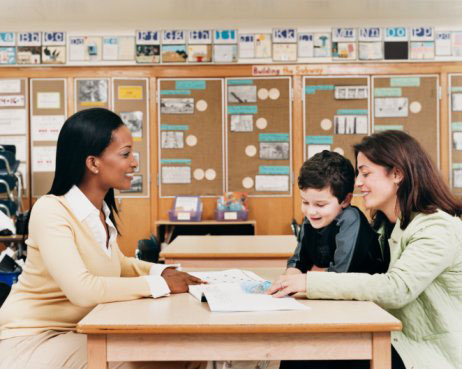
by PRIDE Reading Program Admin | Apr 26, 2012 | A PRIDE Post, Summer Programs
As the school year ends, many students are busy during the summer months with camps, play dates, recreational activities and vacations. Some students might even be bored during the long summer months. When summer ends, students go back to school and often forget much of what they learned the previous year. This is what we call the summer learning loss.
Studies show that summer loss for all students equals about a month of academic learning. For students with learning disabilities, this loss may amount to as much as 3 months! Weaknesses in memory, processing speed, attention and language cause valuable skills to weaken rapidly. As a result, students will have to spend more time reviewing at the beginning of each school year in order to catch up.
Continuing instruction during the summer months can help greatly reduce learning loss as well as gives students the opportunities to dedicate more time than is possible during the school year to remediate and get ahead. Students can make amazing progress during these long summer months!
Pride Learning Center offers Reading and Writing Summer Programs for students of all ages. We offer an intensive Orton-Gillingham reading and writing program (3 hours M-F), as well as standard sessions (1 hour once or twice a week) between June and August.
Summer Catch – Up Program
Do in 4 weeks what would normally take 30-40 weeks!
Our Pride Intensive offers the most dramatic results. Our reading specialists will provide the needed support to get students at grade level during the long summer months. Your child still gets a summer break, as sessions are typically only 3 hours a day five days a week depending on family choice and goals established at the initial consultation. There are still plenty of hours in the day to play, go to the beach or just relax.
Sample Daily Schedule:
9:00 – 10:00 Orton-Gillingham Reading Instruction
10:00 – 10:30 Technology Based Reading Instruction
10:30 – 11:00 Snack, Fun and Movement
11:00 – 11:30 Writing Instruction
11:30 – 12:00 Orton-Gillingham reading Instruction
Summer Get-Ahead Program
Summer is such a great time to review material and get ahead on next year’s curriculum! We offer programs in reading, writing, spelling and comprehension for those students who want to attend Pride once or twice a week.
Reading Readiness at Pride Learning Center
Pre-K – Kindergarten
Pride’s early intervention program will teach your child to read and get ahead in school. By working through our multisensory, Orton-Gillingham reading program step-by-step, your child will learn alphabetic knowledge and understanding of the alphabetic principles in a fun yet structured environment. Your child will receive a strong and solid reading foundation that will last a lifetime.
Reading and Spelling at Pride Learning Center
Grade K – Grade 8
Pride’s multisensory, Orton-Gillingham reading and spelling program is action oriented and involves constant interaction between our Reading Specialists and your child. Each student at Pride learns to read in a systematic, cumulative, structured and step-by-step process. Each lesson encompasses the skills of decoding, encoding, fluency and reading comprehension. Your child will become a strong and independent reader.
Reading Comprehension
Grade 2 – Grade 12
Pride’s highly successful research-based Reading Comprehension Program teaches students to draw meaning from text and to verbally express their understanding of it. Utilizing nonfiction-reading passages on a variety of subjects, the skills that are taught prepare students for standardized tests and provide valuable practice in nonfiction reading knowledge on a wide range of subjects.
Writing Skills
Grade 2 – Grade 12
Pride’s writing skills program effectively teaches essential skills in careful order: from parts of speech, to sentence structure, to paragraphs, to complete essays. For the reluctant beginning writer, our program provides the essential foundation in thinking and writing skills. For the more proficient and advanced writer, it offers opportunities, strategies, and techniques to apply them.
___________________________________________________________________________________________________
Pride Learning Center has locations in Los Angeles, Redondo Beach, Newport Beach and Mission Viejo. For more information visit www.pridelearningcenter.com or call 866-774-3342 ext. 1

by PRIDE Reading Program Admin | Apr 14, 2012 | A PRIDE Post, Reading Skills
The school year is coming to an end and as a parent of a first grader your thoughts are probably turning towards second grade. Is your child ready for second grade reading?
How do you know?
Here is a list of benchmark reading accomplishments for first grade that was included in a report prepared by a National Academy of Sciences panel titled Preventing Reading difficulties in Young Children, Catherine E. Snow.
- Makes a transition from emergent to “real” reading.
- Reads aloud with accuracy and comprehension any text that is appropriately designed for the first half of grade 1.
- Accurately decodes orthographically regular one-syllable words and nonsense words (e.g., sit, zot), using print-sound mappings to sound out unknown words.
- Uses letter-sound correspondence knowledge to sound out unknown words when reading text.
- Recognizes common, irregularly spelled words by sight (have, said, where, two).
- Has a reading vocabulary of 300 to 500 words, sight words, and easily sounded-out words.
- Monitors own reading and self-corrects when an incorrectly identified word does not fit with cues provided by the letters in the word or the context surrounding the word.
- Reads and comprehends both fiction and nonfiction that are appropriately designed for grade level.
- Shows evidence of expanding language repertory, including increasing appropriate use of standard, more formal language registers.
- Creates own written texts for others to read.
- Notices when difficulties are encountered in understanding text.
- Reads and understands simple written instructions.
- Predicts and justifies what will happen next in stories.
- Discusses prior knowledge of topics in expository texts.
- Discusses how, why, and what-if questions in sharing nonfiction texts.
- Describes new information gained from texts in own words.
- Distinguishes whether simple sentences are incomplete or fail to make sense.
- Can answer simple written comprehension questions based on material read.
- Can count the number of syllables in a word.
- Can blend or segment the phonemes of most one-syllable words.
- Spells correctly three-and four-letter short-vowel words.
- Composes fairly readable first drafts using appropriate parts of the writing process (some attention to planning, drafting, rereading for meaning and some self-correction).
- Uses invented spelling/phonics-based knowledge to spell independently, when necessary.
- Shows spelling consciousness or sensitivity to conventional spelling.
- Uses basic punctuation and capitalization.
- Produces a variety of types of compositions (e.g., stories, descriptions, journal entries) showing appropriate relationships between printed text, illustrations, and other graphics.
- Engages in a variety of literary activities voluntarily (e.g., choosing books and stories to read, writing a note to a friend).
________________________________________________________________________________________________
Karina Richland, M.A. is the Founder and Director of Pride Learning Centers, located in Los Angeles and Orange County. Ms. Richland is a certified reading and learning disability specialist. Ms. Richland speaks frequently to parents, teachers, and professionals on learning differences, and writes for several journals and publications. You can reach her by email at karina@pridelearningcenter.com or visit the Pride Learning Center website at: www.pridelearningcenter.com

by PRIDE Reading Program Admin | Mar 7, 2012 | A PRIDE Post, Parent-Teacher Conference
Finally, you have a chance to sit down face-to-face with your child’s teacher. You have a lot that you want to talk about, and a limited amount of time. The better prepared you are going into the meeting, the more beneficial the meeting will be for both you and the teacher. Here are some questions you can think about and then ask your child’s teacher at the next upcoming conference to elicit information and make the rest of your child’s year more successful.
How is my child doing keeping up in class?
Start out by asking the teacher how your child is doing overall. Is he or she ahead, behind, or right on target indicated by grades compared with the average student at the national level? You might want to gain information about this level your child is at. Also ask the teacher if she or he feels that your child will remain at this level- and why.
What information and skills will my child be expected to accomplish by the end of the year?
All children, whether struggling, average, or gifted need to meet higher academic standards and expectations in school. Ask the teacher what your child will have mastered by the end of the school year in reading, math, science and social studies. If your child has already achieved those goals, ask the teacher if there are more challenging academic standards in place in this classroom. If the teacher answers “yes” then ask to please see these. If your child is struggling with the coursework then discuss with the teacher what specific remediation and support is your child receiving. Again ask to see the specific program and what is actually taking place to assist your child in progressing forward.
How are you assessing and monitoring my child’s progress?
Your child needs to be evaluated and monitored during the entire school year to determine progress, remediation needs and advancement of subject areas. During your conference ask your child’s teacher what kind of information he or she is using to evaluate your child and how often these assessments are conducted.
As a parent, what can I do at home to stay involved in my child’s academic progress?
Studies have shown that children who receive regular educational support and encouragement at home do better at school and tend to excel beyond the average.
All teachers welcome and encourage parental involvement, so now is the time to ask how you can help your child at home improve his or her areas of weakness and build on his or her strengths. Ask your child’s teacher to recommend some outside enrichment activities to support his or her learning aside from home and school.
Does my child have friends?
Academics are not the only subjects you will want to discuss with your child’s teacher. Find out how well your child interacts with others, participates in groups and shows value and respect to the teacher and classmates. Talk to the teacher about what you can do to reinforce these qualities, along with what academic lessons you can teach at home to help your child become a more well rounded person.
At the end of the meeting you will want to clarify and summarize all the points discussed during the conference. This way both you and the teacher are better able to develop a mutual understanding and agreement.
_________________________________________________________________________________________
Karina Richland is the Founder and Director of Pride Learning Centers, located in Los Angeles and Orange County. Ms. Richland is a certified reading and learning disability specialist. Ms. Richland speaks frequently to parents, teachers, and professionals on learning differences, and writes for several journals and publications. You can reach her by email at karina@pridelearningcenter.com or visit the Pride Learning Center website at: www.pridelearningcenter.com

by PRIDE Reading Program Admin | Aug 29, 2011 | A PRIDE Post, Language & Reading
By: Renée Firby, MSC CCC-SLP
Over the last several years countless families have come to our offices seeking assistance for their children who are struggling academically. The majority of our school-aged clients present with some form of language learning disabilities. These language learning disabilities can directly impair a child’s reading ability. Research supports that one of the best predictors of a child’s success in reading is an individual’s oral language abilities. So you ask, “What’s the connection?”
As infants we begin to learn language. We respond to pleasant voices by smiling, we turn our heads when we hear sound, and we begin to babble. These emergent language skills continue to grow and develop over the first few years of life to more complex unconscious abilities such as storytelling, developing and understanding humor, making judgments as to the appropriateness of content for certain listeners, editing for errors, learning metaphors, similes, antonyms, synonyms, etc. Although many children acquire the most basic and fundamental components of language such as vocabulary, generating a sentence, and grammar, they fail to learn the more complex language skills. Reading requires the ability to unconsciously define words, recognize synonyms, antonyms, and homonyms, identify parts of speech, recognize grammatical errors, recognize multiple meanings, etc. Therefore, reading is a language-based skill as it utilizes all of the same processes of an individual’s complex oral language skills. If an individual is unable to develop complex oral language skills, they are unable to develop the skills necessary to be a successful reader.
Speech and language intervention is an essential component to the achievement of a successful reader for those who are challenged academically! Intensive treatment supports the development of advanced language skills, which in turn support the skills necessary for reading. Jackson Jade Speech & Occupational Therapy customizes treatment programs that are designed to innervate the areas of the brain responsible for language development, which target the fundamental building blocks for reading including phonemic awareness, phonics, vocabulary development, fluency, and comprehension. Research indicates that stand alone school-based programs are not intensive enough to meet the needs of struggling readers. Children who are enrolled in intensive programs and those who receive early intervention tend to score higher on cognitive and academic achievement measures than those who do not receive intervention or rely on school-age treatment alone.
If your child is struggling with reading there are several things you can do to support their development. In addition to seeking school-based services, enroll them in a reading-based program that uses a multisensory approach and seek a comprehensive language program through a speech language pathologist that specializes in brain based development.
________________________________________________________________________
Renée Firby, MS CCC-SLP is a speech language pathologist and executive director of Jackson Jade Speech & Occupational Therapy. Ms. Firby has extensive experience working with medically, educationally, and cognitively challenged individuals. She has provided speech language pathology services to infants through the geriatric populations ranging from the mildest to most severe impairments.
If you have any questions or would like information about scheduling an appointment at Jackson Jade Speech & Occupational Therapy call 888-808-7838 or visit www.jacksonjadesp.com for more information.

by PRIDE Reading Program Admin | Aug 29, 2011 | A PRIDE Post, ADHD
by Dr. Andrew McIntosh
For some reason, the discussion of fish oil supplementation conjures up images of a mountebank peddling a potion at an old-style country fair. Indeed, the idea of fish oil supplementation to treat a variety of ailments has been around for many decades. Recently, fish oil has received a great deal of attention in the lay media and professional medical literature for the treatment of behavioral disorders such as ADHD.
After diagnosing a child with ADHD and transitioning to talking about treatments, I often start to feel a bit of tension in the room as parents start to think “I know he’s going to recommend medications and as a family we are not prepared for that”. However, before launching into a discussion of different pharmacotherapies for ADHD, it is important to consider nonmedical management. For example, behavior modification strategies have been adequately studied and proven to be beneficial for many children with ADHD. Three less frequently discussed ADHD treatments which I touch upon during my consultations are essential fatty acid (such as contained in fish oil) supplementation, sleep habits and basic dietary changes.
From scientific studies of essential fatty acids (EFAs) and ADHD we know that (1) individuals who have ADHD may have low levels of EFAs and (2) essential fatty acid supplementation may normalize EFA levels in children with ADHD. The clinical significance of this is somewhat less clear; however, most studies provide evidence of lessening ADHD symptoms. As with most scientific studies, there are concerns with study design and confounding factors but the current body of medical literature generally supports the use of essential fatty acid supplementation in children with ADHD.
The benefit of essential fatty acid supplementation for children with ADHD has been adequately established. However, the next question is “What are the associated risks?”. Fortunately, when used in recommended dosages, there are few potentially serious side effects associated with essential fatty acid supplementation. Reported side effects include: Fishy aftertaste (if the product is made from fish oil), nausea, bloating, or burping. Less common, symptoms of a serious allergic reaction, including: rash, itching/swelling (especially of the face/tongue/throat), severe dizziness or trouble breathing may occur. Overall, fish oil supplementation is well tolerated.
There are several commercially available children’s formulations which provide an adequate dosage in a palatable form. The studies evaluating essential fatty acid supplementation for ADHD may serve as a dosing guideline. The three most compelling studies used 500-600mg of Omega-3 fatty acids in a balanced Omega 3, 6, 9 formulation. To keep things simple for my families, I recommend a fish oil-based, balanced product containing Omega 3, 6 and 9 fatty acids with 500-750mg of Omega 3 fatty acids from a high quality manufacturer. Products from Nordic Naturals and other high quality manufacturers are available at local markets (such as Mother’s and some Henry’s markets) and online. If children are not able to swallow the generally large capsules, palatable (“no fishy taste”) children’s formulation liquids and “gummies” are available.
Purchasing guidelines:
Children’s formulation
Fish oil-based product (rather than plant-based)
500-750mg of Omega-3 fatty acids
Balanced Omega 3, 6, 9 product
High quality manufacturer (such as Nordic Naturals)
As evidence in scientific studies continues to build, essential fatty acid supplementation is gaining broader acceptance by mainstream physicians. The current medical literature is generally supportive of the benefit for children with ADHD and the common side effects are relatively mild. For families with children affected by ADHD, essential fatty acid supplementation should be considered an important component of a comprehensive treatment plan.
________________________________________________________________
Dr. Andrew McIntosh is a fellowship-trained pediatric neurologist and is highly skilled in behavioral/developmental disorders (including early autism spectrum diagnosis) and general pediatric neurology. If you have any questions or would like information about scheduling an appointment with Dr. McIntosh, contact his office at (949) 249-3780 or visitwww.mcintoshneurology.com for more information.

by PRIDE Reading Program Admin | Aug 23, 2011 | A PRIDE Post, Auditory Processing Disorder
By Karina Richland, M.A., E.T.
- Is your child easily distracted or bothered by loud or sudden noises?
- Are conversations difficult for your child to follow?
- Are noisy environments upsetting?
- Are verbal (word) math problems demanding?
- Does your child have difficulty following directions?
- Is abstract information tough to interpret?
- Does your child struggle with reading, spelling, writing, or other speech-related language difficulties?
Central auditory processing disorder (CAPD) occurs when the ear and the brain do not coordinate together completely. Many of the behaviors associated with central auditory processing disorder also appear in other conditions such as learning disabilities (LD) and attention deficit disorder (ADHD). The symptoms in each individual can range from mild to severe and only a trained professional, such as a speech-language pathologists and an audiologist who specialize in CAPD, can determine if your child actually has a central auditory processing disorder.
If your child does have central auditory processing disorder and finds it difficult to concentrate and follow directions, there are numerous strategies that parents can implement for their child.
What was I supposed to do again?
In order to help a child with CAPD follow directions, try reducing background noises, always have the child look at you when you are speaking and use simple, expressive sentences. Speaking at a slightly louder volume and at a slower tempo will also help significantly. Have your child repeat the directions back to you aloud a few times and be certain that they understand the directions they are repeating and not just mimicking your voice.
I left my book at school.
A student with CAPD will thrive on routine and structure. Teach your child how to focus and cope in chaotic environments (like middle school). Before going home for the day, for instance, have the child check his or her assignment book and list what he or she needs to take home that day.
I can’t concentrate; it’s too loud in here.
At school the child should sit towards the front of the room facing the teacher with his or her back to the windows, doors, and other sources of distraction. The teacher can periodically touch the child’s shoulder to remind him or her to focus or get ready for a transition. Teachers should use lots and lots of visual aids jotting down instructions or key words on the board, and providing simple written outlines. For younger students a drawing works fine as a reminder.
At home, provide the child with a quiet study place. Keep the TV turned off and any outside stimuli far away. Make sure the work desk is free of clutter and well organized. Maintain a peaceful, organized lifestyle that also encourages good eating and sleeping habits and keeping a neat room and desk.
Teachers and parents both need to remember that central auditory processing disorder is a real condition. The symptoms and behaviors are not within the child’s control. Children with CAPD are not being defiant or being lazy. Help them build a strong self-esteem and learn to advocate for themselves, as they get older. Keep it positive and keep life fun!
__________________________________________________________________________________________
Karina Richland, M.A., E.T. is the Managing Director of Pride Learning Centers, located in Los Angeles and Orange County. A former teacher for Los Angeles Unified School District, Ms. Richland is a Reading and Learning Disability Specialist. Ms. Richland speaks frequently to parents, teachers, and professionals on learning differences, and writes for several journals and publications. You can reach her by email at: info@pridelearningcenter.com or visit the Pride Learning Center website at:
www.pridelearningcenter.com
Page 16 of 18« First«...10...1415161718» 





